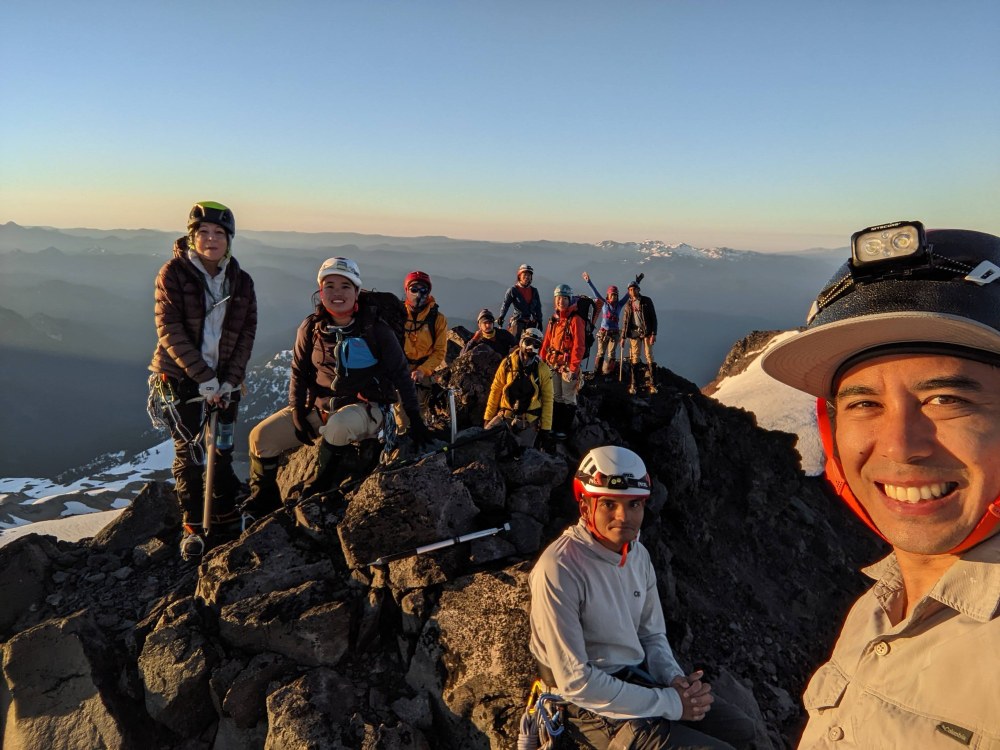
In February 2025, we invited our members and volunteers to participate in our community survey. We do this every few years to understand how experiences change over time and identify areas of need when balancing resources. We’re pleased to share these preliminary results with our community, and look forward to deeper analysis with the staff and volunteer leaders who drive our programs and accomplish our mission in the community.
We first launched this survey in 2011, and have since reported on our findings from 2014, 2016, 2018, 2020, and 2022. We compare new responses with past survey data to track patterns and identify opportunities for improvement. Your feedback from the 2022 survey played a massive role in informing our strategic plan, Adventure with Purpose, which was formally launched in 2023. After cuts during the COVID-19 pandemic, your feedback also confirmed an increasing demand for volunteer support and member services, making a case for reinvestment in these areas. Our traditionally-biannual survey was postponed from 2024 to 2025 due to staff turnover and capacity.
This survey is conducted by staff and the design is informed with input from volunteer leaders. Special recognition is owed to Daniel Poor, six-year member and volunteer data analyst for this project. His expertise - both professional and as a Mountaineers volunteer - provided immeasurable value to the survey design and reporting process. We are incredibly grateful for his role in helping connect members’ values and experiences to our program strategies and impact.
Summary
- Response & representation: we had a strong response rate, but respondents are not entirely representative of our membership, skewing toward longer tenured and more involved. This is a key limitation of our findings.
- Recommend & renewal intent: we continue to trend high in satisfaction and recommendation, and see improvement in intent to renew.
- Impressions: members highly value opportunities to participate in courses and activities, and appreciate The Mountaineers conservation efforts. Respondents feel safe and valued in our community. Course and activity capacity, a desire for more relaxed activities, and increasing experiences of cliquishness emerged as potential areas for improvement.
- Strategic plan & mission impact: members strongly support the priorities as outlined in our strategic plan; however, many are unaware of The Mountaineers accomplishments in some key impact areas.
- Volunteer lifecycle & support: most members want to maintain or increase their level of involvement as volunteers. Volunteers highlighted staff-supported training, administrative assistance, and clearer leadership pathways as critical areas of support.
- Other feedback: open text responses added depth and understanding to the quantitative results, and we noted themes that emerged organically and shared a few here.
- Next steps: this report is the start of how we will be using and sharing this information within our community, and is just one way members provide input on our direction. Read on for ways that Mountaineers leaders can further investigate these results, and how all members can provide ongoing feedback on their ideas and experiences.
Response & Representation
The online survey was conducted from January 29 through February 16, 2025. Overall, 16% of the 12,801 people who were emailed responded. To put this in perspective, generally 2-3% is considered a strong response rate for similar surveys. Survey links were sent to all adult members in good standing who have not opted out of Mountaineers emails.
The survey was designed to get a snapshot of member demographics, impressions, experiences, and ideas. Most of the questions were multiple choice and almost all questions were optional. We also looked at responses to open-text questions to add depth and understanding to the quantitative results. These were framed to be as open-ended as possible to give weight to themes that emerged organically.
While we use this survey as an important check-in tool with our community, we also understand that many voices are missing from these results. Our respondents skewed slightly older, more female, had a longer tenure of membership, and were more likely to be volunteers than our overall membership. In other words, members less represented in this survey include younger, newer, less involved members. We also had proportionally less participation from Seattle branch members, with higher or more representative rates of participation from other branches. Additionally, the survey was not sent to non-member or lapsed members.
All of our observations reported here should be considered with representation in mind.
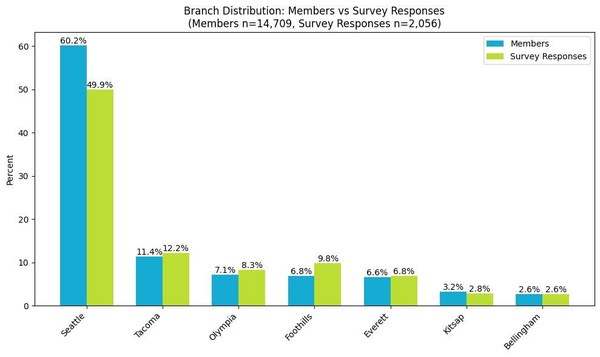 Branch distribution of members vs survey respondents.
Branch distribution of members vs survey respondents.
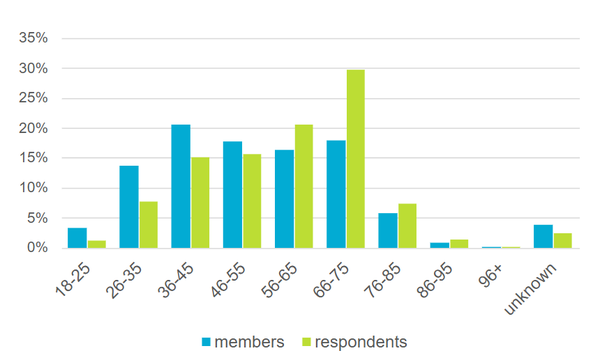 Age distribution of members vs survey respondents.
Age distribution of members vs survey respondents.
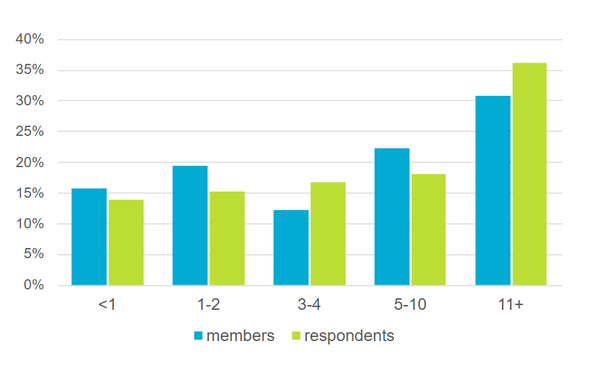 Member Tenure of members vs survey respondents (years).
Member Tenure of members vs survey respondents (years).
Of our 16,000+ individual members, roughly half are active as participants in a given year. Others do not actively participate in programs, yet continue to support The Mountaineers because of their connection to our mission and alignment with our values. The average membership length is 5.4 years.
Of the active members, roughly 2,500 are classified as active volunteers, having led in the previous 12 months or are on the schedule to lead in the next 12 months.
Recommend & Renewal Intent
We continue to trend high in satisfaction, recommendation, and intent to renew.
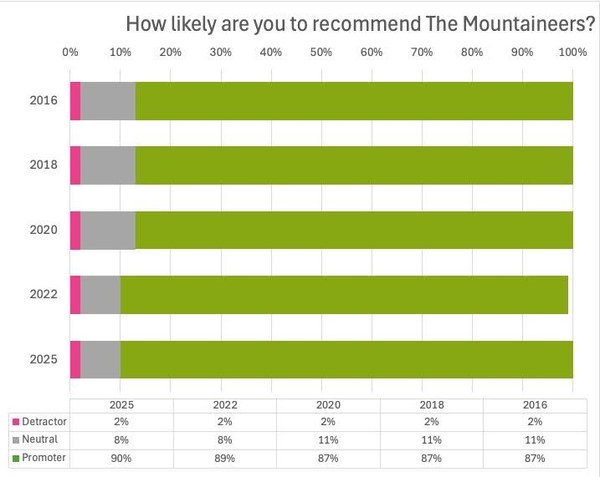
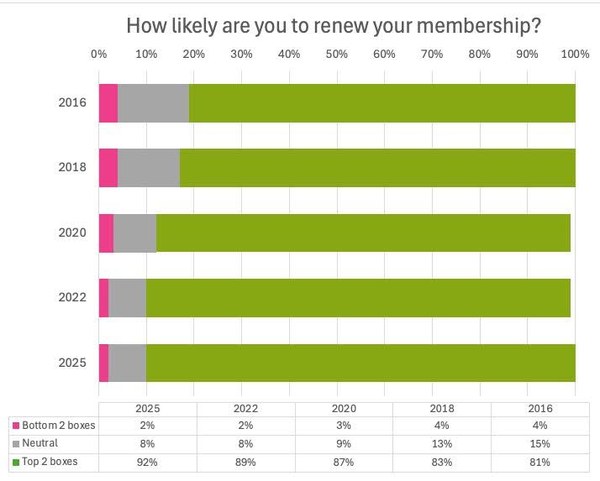
The leading reasons that people join The Mountaineers are to participate in outdoor activities, learn skills through courses, make friends, and learn more about Washington State. The leading reasons that members renew are to participate in outdoor activities and learn skills through courses followed by a desire to support our mission and, specifically, our conservation work. We’re proud of this legacy as advocates for public lands and the natural world, and hope to carry it forward as we work toward equitable outdoor access for all people.
Impressions
Generally, respondents see The Mountaineers as a place to learn new skills and find opportunities to recreate safely in groups, and as a place that offers good value. We’re happy that people see us as a nonprofit working toward important conservation causes, and as a place to make lifelong friends.
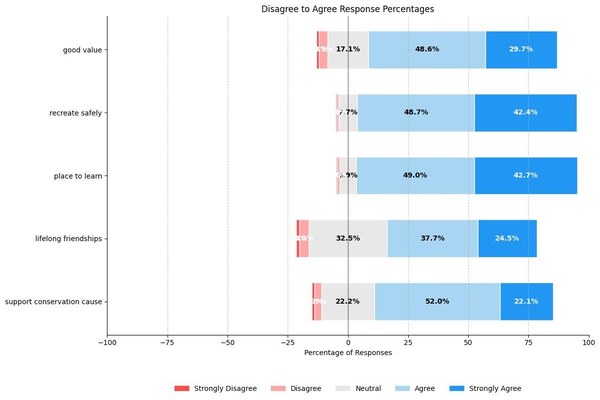
Impressions of Programming
According to results, Mountaineers courses and activities are relevant to the interests of our members, and it is generally easy to participate and get help when needed.
Capacity in courses and activities was identified as an area for improvement. In open responses, 55 members cited capacity as a primary barrier to participation. While impressions in this area improved over the last ten years, addressing capacity is still a high priority for attention from Mountaineers leaders.
“In my first year, last year, I only did two activities. I couldn't get into others and that was disappointing … It seems easier [to join other groups], but I prefer the expertise & professionalism of The Mountaineers.”
One theme that emerged from open responses is a desire for activities that are less physically challenging or focus on reflective aspects. 34 members mentioned wanting slower or easier activities, and 11 members mentioned or described mindfulness as an important part of their outdoor experience.
“I'd like to see opportunities for outdoor interaction that are not necessarily focused on exercise. Examples: sketching, painting, photography. Most of the activities support using nature as a backdrop for exercise or a kind of jungle gym; it's not very common to find an activity focused on immersing and reflecting.”
Impressions of Belonging
The results indicate that respondents feel welcome and safe, and can find lasting friendships at The Mountaineers. Those who took the survey also experience The Mountaineers as a place that values all genders, all sexual orientations, and all racial and ethnic/national identities. While we saw overwhelmingly positive responses in these areas, it is worth considering the representative limitations of the survey as explained above. In open responses, 22 members shared a desire to continue, improve, or increase our diversity, equity, and inclusion efforts. Members also suggested offering more body-inclusive activities, increasing representation among members, enhancing accessibility for people living with disabilities, and taking action based on input from marginalized and underrepresented communities in the outdoors.
One of the growth areas identified is that some experience The Mountaineers as cliquish, with this impression worsening since 2020 and 2022. In open responses, 22 members cited cliquishness as a barrier to involvement.
Strategic Plan & Mission Impact
Our strategic plan, Adventure with Purpose, was launched in 2023, informed in part by our 2022 Member & Volunteer survey results. The plan outlines our priorities to lead innovation in outdoor education, engage a vibrant community of outdoor enthusiasts, and advocate on behalf of the natural world. Each of these has three sub-goals, which you can read more about in our strategic plan.
This 2025 survey was a great opportunity to check in on perceptions of impact.
What is important?
Survey respondents indicated high support for each component of the strategic plan, however four strategic priorities rose to the top with more than 95% of respondents identifying them as important:
- Advocating for public lands, climate solutions, and outdoor recreation access (98.2%).
- Reducing our impact on the environment through education and sustainability improvements to operations (97.5%).
- Supporting and retaining volunteer leaders (96.5%).
- Promoting an inclusive outdoor community where everyone feels belonging (95.1%).
How are we doing?
Those who indicated that a goal was important to them were given the option to rate our effectiveness on that goal, and a few observations stand out:
- Very few people believe that The Mountaineers is not effective (less than 5% across all goals), but many (30-35%) reported that they didn’t know about our effectiveness in most categories.
- “Publishing books that inspire and educate recreationists and conservationists” had the strongest effectiveness ranking with 80%+ indicating that they believe we are effective. Less than half a percent believe we are not effective, and 18% didn’t know.
- “Providing outdoor education for youth” and “improving equitable access to the outdoors by addressing financial barriers” had the highest percentage of “I don’t know” responses (65%).
Read more about our mission impact.
Volunteer Lifecycle & Support
Almost all of our outdoor education programming at The Mountaineers is led by volunteers. Our ability to deliver on our mission and strategic plan is only possible through their generosity and expertise.
More than half of respondents hope to volunteer about the same amount as they did last year (whether 500+ hours or hardly at all). About a third of respondents want to volunteer more, with top reasons being a desire to spend more time outside in community, and improving their own outdoor and leadership skills. About a tenth want to volunteer less, most of whom cited personal barriers such as health, free time, or moving away from the region.
Mountaineers staff provide essential support to volunteers; survey takers who self-identified as volunteers were asked to rank the importance of staff-led support services. The clear frontrunner was “training and leadership development opportunities.” “Administrative support (permitting, budgeting, insurance)” and “guidelines for becoming a leader” came in second and close third. “Tech support” and “opportunities to share best practices with other leaders” were tied next. Other support services offered by staff include “Course feedback & evaluation,” “volunteer recognition,” “marketing courses & trips,” and “data & reporting.”
Other Feedback
Open-text responses added depth and dimension to the quantitative results. These opportunities to share ideas and experience were intentionally offered without much framing, giving weight to themes that emerged organically. Here are a few examples:
More social events
- “I wish there were more opportunities for in-person interaction beyond courses and activities … Why not have a monthly gear repair night, or an outdoor book club? How about a night for hikers to get together and talk about their favorite recent hikes? Or if these events already exist they should be publicized more.”
- “I thought there would be more in-person events to build community and routine. A speaker series that's accessible to all, something for photography, adventure travel, outdoor adventures, etc. would be great. Something related to getting outdoors but that is an accessible and fun thing to do on a weeknight.”
Equivalency as a barrier to involvement
- “I completely understand and appreciate the need for a structured process to ensure safety. … However, my concern is that there are not enough opportunities to meet the participation requirements.”
- “The badge prerequisites have stopped me from joining activities. It would be helpful to have some sort of flowchart/map with what badges are needed for which activities.”
Teaching & Gathering Spaces
- Desire for program centers for Foothills, Olympia, Everett, Bellingham, and Kitsap Branches.
- Improving utilization of existing properties to better support programs.
- Ideas for new branches in Vancouver, Eastern Washington, Idaho, and Oregon.
Affinity Groups
Many people wanted to see more affinity groups. Affinities and identities mentioned include: millennials, elders/seniors, women, LGBTQ+, singles, veterans, BIPOC, “injured Mountaineers”, members with medical conditions or disabilities, homeschooling families, and divorced people.
Structural Barriers to Volunteerism
- “For committees it's not clear to me what help and skill is desired and needed.”
- “Several [committees] are saying they want and welcome new leaders. I don't think they realize they are simultaneously creating barriers and providing non-verbal signals that they don't really want newcomers.”
- “I don't know who to contact or how to get started.”
And good vibes
- “I get so much value out of my Mountaineers membership. I love learning and recreating in community, and I appreciate the leadership development that I regularly observe. Keep it up, please!”
- “I very much appreciate all the time and energy that people give to The Mountaineers. I have been so impressed at the depth of talent and knowledge I have seen in the volunteer leaders and staff of The Mountaineers. I am so glad that I found this group. I have felt supported and respected as a participant and feel welcome at every event. Mountaineers are great people with whom to spend time and to share our beautiful PNW.”
- “I'm really happy I joined The Mountaineers. I'll be a champion for the organization and am ready to advocate for conservation initiatives.”
- “I'll be a 50-year member next year. It's a great organization that's given me friendships, training, and confidence to continue with my mountain adventures for many years. I'm now 75, still get out on my own for an occasional hike and scramble, enjoy the Mountaineers magazine, the Banff Mountain Film Fest, and numerous talks and other programs. My son usually goes to the bookstore to get Christmas and birthday books for me (which he knows I love), and being a mountain adventurer is a big part of my personal identity. I'd say keep training new climbers and fighting to protect our sacred spaces. Oh, and don't forget to include trips/adventure stories in the magazine!”
Conclusion & Next Steps
This blog is just the start of how we will be using and sharing this valuable information within our community.
Next steps for these results
In addition to the summaries above, we also asked questions about communication preferences, youth programs, safety, and more. More comprehensive reports are being shared with staff working groups, such as our Youth Programs team and Community Engagement team, as well as The Mountaineers Board of Directors and subcommittees, such as the Sexual Harassment and Sexual Assault Prevention committee.
Next steps for volunteer leaders
Perhaps this blog is giving you an idea for your trips, courses, or committees. Or maybe you’d like to know more about the data available to you to help guide your programs. Here are some options:
- Committee or branch chairs can request a meeting, report, or presentation to further unpack findings from the 2025 Member & Volunteer Survey. Email Mckenzie to start the conversation.
- Committee members or course leaders can request one-time data pulls and anonymized reports to support strategic decision-making for programs. Send requests to info@mountaineers.org.
- Branch dashboards showing aggregate numbers of members, trips, volunteers, etc. are available to branch-affiliated leaders on the “About us” page for each branch.
Next steps for members
Our biannual member survey is just one way we receive input from members. Feedback at all levels is an important part of how we improve our programs, strengthen our community, and deliver on our mission. Here are some other options:
- Give feedback on courses, events, and activities. Built into almost every activity and meeting, this anonymous feedback form is reviewed by the activity leader and the activity committee.
- General feedback. Logged-in members can post, comment on, and vote on ideas for improvement. This page is publicly viewable and reviewed regularly by staff. Improvements are reported on our blog.
- Behavior complaint. These should be used when there has been a breach of our Code of Ethics or Behavior Standards Policy. These confidential reports help address concerning behavior and promote our goal of creating an emotionally and physically safe environment for all.
- Incident reports. These should be used when there is an incident, accident, near miss, or other safety concern at a Mountaineers activity. Incident reports are reviewed by staff, branch chairs, activity chair, and The Mountaineers Safety committee.
Thank you to everyone who participated in the 2025 Member & Volunteer Survey. Your thoughtful and honest feedback, and the time you spend sharing it with The Mountaineers, is a gift. We hope you are excited about our future.
 The Mountaineers
The Mountaineers